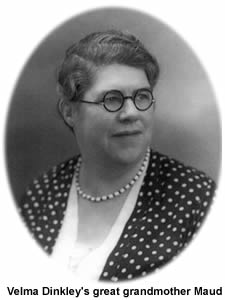During the Second World War my mum, her sisters and parents were evacuated from Eastbourne to Thrupp in Gloucestershire, where my grandfather, a carpenter by trade, worked in a local aircraft factory.
My mum’s maternal grandmother, Maud, took a job as a cook at the vicarage in Bredon near Tewkesbury, Worcestershire and they would sometimes visit her there. One of the memories my mum has of this time is watching her grandmother baking bread in the vicarage’s kitchen.
My mum and her two sisters would watch her preparing the dough on the large wooden kitchen table. Whilst the dough was left to rise, she would busy herself around the kitchen, tidying away after breakfast and preparing lunch for the vicar and his family.
Once the dough was proved, she would divide it in two, with one piece larger than the other, then would pull off three small pieces for each of her granddaughters. Whilst she was shaping the two larger pieces into circles and flattening the tops with a rolling pin, her granddaughters would be shaping theirs into balls with their hands and patting them slightly.
The two large pieces of dough were put on top of one another, with the smaller one on top to form a large cottage loaf and placed in the old bread oven, along with the three small balls of dough. It wasn’t long before the kitchen was filled with the smell of freshly baked bread, and the girls were rewarded for their efforts with a hot roll, which billowed with steam as it was cut open.

Maud was born in Battersea, London in 1885. At the time of the census in 1891, when she was just 6 years old, she and her older sister, Alice, were visitors in the household of Joseph Allen, a baker, of 86 Sunnyhill Road, Streatham.
Joseph had married Maud’s maternal aunt, Alice Cousins, in Lambeth in 1871. Sadly they didn’t have any children of their own, so would have been very fond of their young nieces.
I can imagine the two girls watching their uncle baking bread and him giving them each a small piece of dough to make into a roll. It must have been a special treat for the girls to visit their aunt and uncle and to watch the goings on in the busy baker’s shop.
Joseph and Alice had moved to Sunnyhill Road, just off the Streatham High Road, sometime during the 1880s and remained there to at least the time of the 1901 census. Previously they had a shop at 8 Cornwall Road, Lambeth, and the 1881 census shows Alice’s unmarried sister, Louisa, living with them, working as a baker’s assistant. They also had two male servants, one described as a baker and the other as an errand boy. However in 1891 and 1901 no servants were listed.
Joseph was born in Woodbridge, Suffolk in 1842 and I found him there on the 1861 census working as a baker (journeyman), before he had moved down to London. The life of a journeyman baker in London during this era was hard.
They would spend their day delivering the bread prepared and baked in the early hours of the previous morning, only to start again an hour or so before midnight by preparing the dough. Their rest would come as the dough was allowed to rise, but only for a couple of hours, as once it was ready, the next few hours were spent preparing and baking the bread to be delivered later the same day.
Bread was the staple diet of the poor in Victorian London. W.B. Tegetmeier’s book ‘Manual of Domestic Economy’ first published in the 1850s and continued in print for almost 50 years, advised that –
“A labourer should eat daily nearly 2lb [of bread], the wife and growing boys above ten years of age, 1¼ to 1½ lb, and every child as much as it likes. If you are very poor, spend nearly all your money on bread”.
He also recommended the consumption of milk and meat, and gave basic cooking instructions, although as the poor didn’t possess a stove, they would take their prepared dishes to cook in the local baker’s oven, still warm after the day’s bread had been baked.
Charles Dickens mentioned the procession of dinner-carriers on Christmas Day in his book ‘A Christmas Carol’.
Even though the London baker played an important role in the inhabitant’s diet, they were not innocent when it came to the adulteration of food. It was common for bread to contain chalk, potato flour and alum to whiten the loaf and to cut costs.
By the time of the 1901 census, Maud had left London and was a scullery maid at Wakehurst Place in Sussex. She met my great grandfather and returned to London to marry him in 1903. Joseph was one of the witnesses named on their marriage certificate, and as Maud’s father had passed away 3 years previously, it’s quite possible that he also gave her away.
Unfortunately, I have been unable to trace Joseph and Alice after the time of Maud’s marriage. He was 61 years old in 1903, so I don’t expect that he would have worked as a baker for many years after that. However, it was the time spent in his baker’s shop which left a lasting impression on Maud. She was renowned for her baking skills in the village where she lived in Sussex, and after her husband died and her children had left home, she moved away, becoming a live in cook, where she taught her granddaughters to bake bread as her uncle had shown her over 50 years before.
Velma Dinkley
© Velma Dinkley 2008